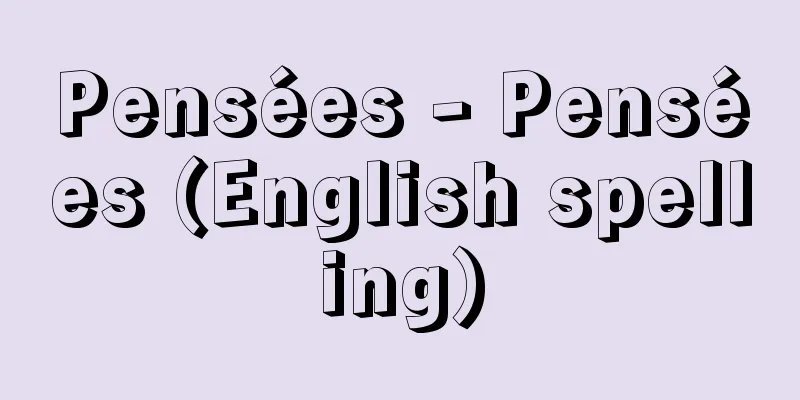Pensées - Pensées (English spelling)

|
A collection of Pascal's posthumous writings. It is also translated as Meditations. After Pascal's death, the first edition was published in 1670, entitled Pensées de M. Pascal sur la religion et sur quelques autres sujets. Many of the fragments left behind are notes for the planned Apology for the Christian Religion, and many editions have appeared due to the arrangement of the fragments. The most widely read edition is the Branschwig edition (1897), but the Lafuma edition (1951), which prioritizes the first manuscript, is now recognized as the standard publication for Pascal studies. The Apology for the Christian Religion aims to prove the truth of Christianity and lead people to faith. Pascal considered it in two parts: anthropological and theological considerations. First, humans, who are intermediate between infinity and nothingness, are shown as contradictory beings of misery and greatness. The misery of man is evident from his powerlessness to truth and justice, and his insignificant place in the universe. But man is also a "thinking reed." Therein lies man's greatness and dignity. Man is great because he knows his own misery, but being conscious of his misery does not save him. Man seeks diversions to forget his miserable existence. In the face of such human existence, philosophers such as Epictetus and Montaigne are also powerless. They all see only one side of man, and cannot resolve the misery that arises from the duality of misery and greatness. To save man, we must move from the anthropological dimension, such as philosophy, to the theological dimension. "Man is infinitely more than man." Thus, Pascal turned to the study of religion, and tried to clarify that Christianity shows the way to resolve the contradictions of man and escape from misery. Pascal says to reject powerless reason and seek God with all one's heart. He teaches that only by doing so can we leap beyond the order of the body and the mind into the order of "love" in which a deep inner relationship with the living God is secured through Christ. [Tomoaki Kagawa] "Pensées" (translated by Maeda Yoichi and Yuki Yasushi, Chuko Bunko/translated by Matsunami Shinzaburo, Kodansha Bunko/translated by Tanabe Tamotsu, Kadokawa Bunko)" ▽ "Pensées by Tanabe Tamotsu (Yuhikaku Shinsho)" ▽ "Comments on Pascal's "Pensées" 1" by Maeda Yoichi (1980, Iwanami Shoten)" [Reference] |Source: Shogakukan Encyclopedia Nipponica About Encyclopedia Nipponica Information | Legend |
|
パスカルの遺稿集。『瞑想(めいそう)録』の訳名もある。パスカルの死後、1670年に『宗教その他若干の主題についてのパスカル氏の思想(パンセ)』Pensées de M.Pascal sur la religion et sur quelques autres sujetsと題された初版が刊行された。遺(のこ)された断章の多くは執筆予定の『キリスト教弁証論』の覚え書きであり、断章の配列をめぐって多数の版が現れた。もっとも広く読まれてきたのはブランシュビック版(1897)であるが、現在では第一写本を優先するラフュマ版(1951)の系列が、パスカル研究の標準的刊本として認められている。『キリスト教弁証論』はキリスト教の真理性を証明し、人々を信仰へと導くことを目的としている。パスカルはこれを人間学的考察と神学的考察の二部構成で考えた。まず、無限と無の中間者である人間が、悲惨と偉大の矛盾的存在として示される。人間の悲惨は、真理や正義に対する無力や、宇宙における取るに足らぬ位置から明らかである。だが、人間は「考える葦(あし)」でもある。そこに人間の偉大と尊厳がある。人間は自分の悲惨を知るゆえに偉大であるが、悲惨を意識することで人間は救われはしない。悲惨な存在であることを忘れるために人間は気晴らしを求めるのである。こうした人間存在を前にしては、エピクテトスやモンテーニュなどの哲学者も無力である。彼らはいずれも人間の一面しかみていず、悲惨と偉大という二重性から生じる不幸を解消できない。人間の救済には、哲学のような人間学的次元から神学的次元へ進まなければならない。「人間は無限に人間を超えている」のである。こうして宗教の考察に向かったパスカルは、人間の矛盾を解き、悲惨から脱する道がキリスト教によって示されていることを明らかにしようとした。無力な理性を退け、心を尽くして神を探し求めよ、とパスカルはいう。それによって初めて、身体と精神の秩序を超えて、キリストを介して生ける神との深い内的関係が確保される「愛」の秩序へと飛躍することが可能となる、と説くのである。 [香川知晶] 『『パンセ』(前田陽一・由木康訳・中公文庫/松浪信三郎訳・講談社文庫/田辺保訳・角川文庫)』▽『田辺保著『パンセ』(有斐閣新書)』▽『前田陽一著『パスカル「パンセ」注解 1』(1980・岩波書店)』 [参照項目] |出典 小学館 日本大百科全書(ニッポニカ)日本大百科全書(ニッポニカ)について 情報 | 凡例 |
Recommend
Mandatory Laws and Optional Laws - Mandatory Laws and Optional Laws
When the legal effects of a certain provision occu...
Robert Jemison Van de Graaff
1901‐67 American physicist. He studied engineering...
Ground pounding song - Ground pounding song
A Japanese folk song. It is also called a dotsuki-...
avoidance conditioning
...The degree of conditioning can be expressed as...
Fulbright Exchange Program - Fulbright Exchange Program
After World War II, this cultural exchange program...
Edo Senke style
One of the schools of tea ceremony founded by Kaw...
Smoke jack
...The rotating lanterns that have been around in...
Intourist - Intourist
... One of the industries that has recently emerg...
Great Bearded Bat - Great Bearded Bat
...It flies slowly flapping its wings at a low al...
Machiko Hasegawa
Manga artist. Born in Saga Prefecture. Losing her...
Symptomatic treatment - taishouryouho
When treating a patient with a certain disease, c...
Kishner, N.
...A reduction reaction that converts the carbony...
Underworld - Meifu
〘 noun 〙 The world after death. The underworld. Es...
Biomekhanika (English spelling)
Also known as biomechanical or anthropodynamic the...
Ursinus, Z. (English spelling) UrsinusZ
…After becoming ruler of the Palatinate, Elector ...









